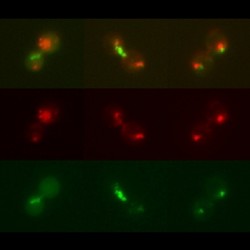By Helen Figueira
February 7, 2009
Time to read: 2 minutes
 Rewriting our understanding of mitosis
Rewriting our understanding of mitosis
The ability of eukaryotic cells to replicate by mitosis is central to the success and proliferation of all higher organisms. During mitosis, replicated chromosomes made between mitotic cycles are split into daughter chromatids that make up the genetic material of two new cells; as they align at opposite poles of the parent cell, they become ‘hyper-condensed’.
Perhaps unsurprisingly, a multitude of precisely orchestrated events must occur to facilitate the act of mitosis. In most eukaryotes, the process of transcription – whereby the genetic information in DNA is used to make proteins – actually stops. It had previously been suggested that the chromosomes being so condensed leads to transcription stopping.
The single-celled eukaryote Saccharomyces cerevisiae – budding yeast – was proposed to buck this trend, because levels of transcription indicated by cellular RNA levels remained elevated throughout mitosis. This seemed counterintuitive, because it was known that the most highly transcribed regions, comprised of ribosomal DNA (rDNA), are actually in a condensed state towards the end of the mitotic cycle.
Now, a team of researchers in the CSC’s Cell Cycle Group, led by Luis Aragón, has used a more sensitive technique to measure RNA levels in budding yeast. They found that it was lowered during mitosis, but at a later stage (termed, ‘anaphase’) than in other eukaryotes (where it occurs in ‘metaphase’).
To understand how this was taking place, the role of Cdc14, a protein phosphatase known to be crucial in chromosome segregation, was explored. It had previously been shown that Cdc14 inhibits the transcription of the highly transcribed rDNA by acting on RNA polymerase I (Pol I) – the cellular machine responsible for transcription. However, the reason for the requirement of Cdc14 remained obscure. The authors conducted experiments in vitro employing all the biochemical machinery of transcription, and found that purified Cdc14 actively inhibits the occupancy of Pol I to stop transcription, whereas a ‘phosphatase-dead’ mutant did not. Transcription continued in the latter case.
Finally, the authors challenged the present dogma that chromosome condensation blocks transcription. In an elegant series of experiments they demonstrate that the molecule that promotes chromosome condensation – named ‘condensin’ – cannot be loaded to DNA until transcription stops.
Contrary to what was previously thought, this means that transcription interferes with chromosome condensation, and not the reverse.
Stefan Janusz
This work was published in Nature